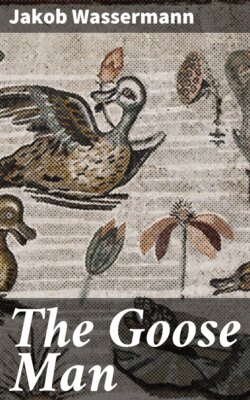Читать книгу The Goose Man - Jakob Wassermann - Страница 7
На сайте Литреса книга снята с продажи.
V
ОглавлениеTable of Contents
Jason Philip Schimmelweis left the dark basement on the square, rented a shop near the bridge by the museum, and set up as a bookseller. Thus his old ambition was realised at last.
He hired a shop-assistant, and Theresa sat all day at the till and learned to keep books.
When she asked her husband what was the source of his capital, he answered that a friend who had great confidence in his ability had advanced him the money at a low rate of interest. He added that he had been pledged not to divulge the name of his friend.
Theresa did not believe him. Her mind was full of dark forebodings. She brooded incessantly and grew to be watchful and suspicious. In secret she tried to ferret out the identity of this nameless friend, but came upon no trace. Now and then she tried to cross-question Jason Philip. On such occasions he would snarl at her malignantly. There was no talk of the return of the money or of the payment of interest on it, nor did the books show an entry of any sort. To rid herself of the anxieties that accompanied her through the years, it would have been necessary for Theresa to believe in helpful fairies. And she did not believe in them.
Nature had given her neither gaiety nor gentleness; under the pressure of this insoluble mystery she became ill-tempered as a wife and moody as a mother.
When there were no customers in the shop she would pick up books quite at random and read in them. Sometimes it was a novel dealing with crime, sometimes a garrulous tract dealing with secret vices. Such things were needed to attract a public that regarded the buying of books as a sinful waste. Without special pleasure, and with a morose sort of thirst for information, she read revelations of court life and the printed betrayals of all kinds of spies, adventurers, and rogues. Quite unconsciously she came to judge the world to which she had no real access according to these books which offered her as truth the issues of sick and pestilential minds.
But as the years went on, and prosperity raised Jason Philip definitely into the merchant class, he abandoned the shadier side of his business. He was a man who knew his age and who unfurled his sails when he was sure of a favourable wind. He entrusted his ship more and more to the ever swelling current of the political parties of the proletariat, and hoped to find his profit where, in a half-hearted way, his convictions lay. He exhibited a rebel’s front to the middle-classes, and held out a hand of unctuous fellowship to the toiler. He knew how to make his way! Many an insignificant shop-keeper had been known to exchange his musty rooms for a villa in the suburbs, to furnish it pretentiously, and to send his sons on trips abroad.
In these days, too, the old imperial city awoke from its romantic slumber. Once the sublime churches, the lovely curves of the bridges, and the quaint gables of the houses had formed an artistic whole. Now they became mere remnants. Castle and walls and mighty towers were ruins of an age of dreams now fortunately past. Iron rails were laid on the streets and rusty chains with strangely shaped lanterns were removed from the opening of narrow streets. Factories and smoke-stacks surrounded the venerable and picturesque city as an iron frame might surround the work of some old master.
“Modern man has got to have light and air,” said Jason Philip Schimmelweis, and clinked the coins in his trousers pocket.
